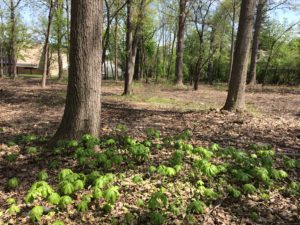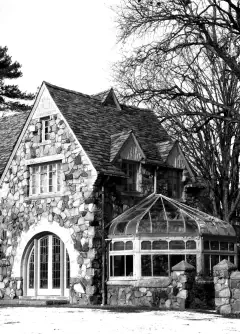By Luther Houle
Mott Community College (MCC) is transforming the former Woodside Church at 1509 E. Court St into the Lenore Croudy Family Life Center. The $10.5 million project will improve Mott’s Early Childhood Learning Center and host an assistance center for students struggling with food, housing, and security.
Dawn Hibbard, communications specialist at MCC, explained the plans at the Nov. 15 College Cultural Neighborhood Association (CCNA) meeting.
Roughly 40 community members met at Mott’s Regional Technology Center, joined by guests and speakers, as they do every third Thursday every other month. Highlights from the meeting included the Neighborhood Watch report and an investigation into pollution in Gilkey Creek. Following this, Hibbard gave a presentation covering what new services and programs the new family life center will provide, as well as what kind of construction community members can expect to see over the next year.
Project to address barriers to college completion
Renamed as The Lenore Croudy Family Life Center, the changes to the Woodside building are meant to help students stay on track to graduate when life throws curveballs at them. “We have a lot of students who come forth with barriers to completion,” Hibbard said. “One of those things that prevent them from completing…is childcare.”

Lenore Croudy (used by permission of Mott Community College)
Croudy died in January, 2017. A 40-year educator with the Flint Community Schools, she had been an MCC trustee for 29 years, including 21 years as the board chair. She worked with six MCC presidents and presided over the board when the Aspen Institute named MCC one of the ten best community colleges in the nation.
Mott has used a wing of Woodside for a childcare center since 1980. With the purchase of the building, daycare will expand from three-to-five-year olds to zero-to-five-year olds. The center is open to the public, but heavily subsidized for Mott students with potential for scholarships and financial aid to help them pay, Hibbard said.
She said a report from HopeLab on food and security among community college students found that 50 percent of Mott students were unable to afford food in the past year. Further data revealed 49 percent have struggled with housing and security, and 11 percent have faced homelessness.
The first floor of the building will feature the Mott Eats food pantry, Department of Health and Human Services (DHHS) services, and Ellen’s Closet, a program which provides donated dress clothes to students for job interviews.
Construction and renovation work to focus on traffic flow, play area redesign
The architectural firm Integrated Design Solutions of Troy has planned several landscaping and construction projects for the landmark building, Work will begin in March, Hibbard said.

Curved entryway to landmark building (Photo by Ed Custer)
The driveways are being redesigned and the parking lot expanded to help traffic flow through the west end of the center, instead of through the residential east end. The preschooler playground is being moved closer to the center, and a new toddler playground is being built on the building’s west side.
Both will have a newly planted treeline and landscaping to protect the children from street noise. A new indoor play area is being built as well. The center will maintain some of the church features such as the bell tower and bells, and the sanctuary as well as the pipe organ will remain as they are for musical and presentational events.
The Woodside Church congregation, which recently purchased the Carriage Town Antiques/Hoffman’s Deli building downtown for a reported $330,000, is keeping the stained glass windows and historical marker that had been outside the building. Some of those windows had been brought from an earlier location of the church in downtown Flint, Pastor Deborah Conrad said.
The East Court Street building, a nationally-noted architectural landmark, was designed by internationally-known Finnish architect Eero Saarinen and built by his brother-in-law Robert F. Swanson in 1952.
Woodside Woods plans include paths, light pollution abatement

Woodside Woods in May (Photo by Jan Worth-Nelson)
Hibbard also brought up plans for the recently cleared woods bordering the church. Some neighbors have expressed concern about the new sight lines through the woods, and many more said they were saddened by the loss of one of the neighborhood’s natural areas.
The college plans to reinstate a serpentine woodchipped path through, with a focus on keeping the woods natural, safe, and usable by students and residents alike. Additionally, MCC landscapers are considering making a green barrier to control light pollution for the surrounding neighbors.
“Campus safety people, over the years, have found a lot of people doing not-such-legal things in those woods,” Hibbard said. The changes are meant to keep the area safer for students and residents, she said.
Mike Herriman, chair of the CCNA’s Neighborhood Watch Committee, also stepped up to report that the watch has not heard of any criminal activity in the woods since its clearing. Herriman says in the past, activity seemed to generate from the area as people used the trees to hide, watch homes, and keep stolen property.
Funding sources detailed
As announced in an April press release from the college, the Woodside project is being funded by a $3 million grant from the Charles Stewart Mott Foundation, proceeds from the sale of $3 million in voter-approved bonds and a $100,000 grant from the McFarlan Charitable Corporation/McFarlan Villages.
The remaining balance, according to Hibbard, will be raised from additional grants and a “Lenore’s Lifetime Friends Campaign.”
The next meeting of the CCNA full membership is 7-9 p.m. Thursday, Jan. 17, 2019. The CCNA Neighborhood Watch group meets 7-9 p.m. Thursday, Dec. 20. Both meetings are in the Mott Regional Technology Center Auditorium, 1005 on the first floor.
EVM staff writer Luther Houle can be reached at lhoule@umflint.edu. EVM editor Jan Worth-Nelson contributed to this report. She can be reached at janworth1118@gmail.com.


You must be logged in to post a comment.